#and also a metaphor for disability and neurodivergence and so much more depending on the episode and creature
Explore tagged Tumblr posts
Text
Very @monstrousagonies -core
that whole fantasy trope of werewolves and vampires hating each other pisses me off every time. it's like lgbt exclusionism you feel me. like I bet the real ones think it's dumb. they're out there going guys we're all children of the night. in their eyes we're ALL unholy abominations. bet there's posts on darkcreatures.net like vampires and werewolves are actually kissing on the lips rn
#if you've ever wanted a podcast where being a fantasy creature operates as a very clear queer allegory#and also a metaphor for disability and neurodivergence and so much more depending on the episode and creature#I highly recommend
22K notes
·
View notes
Text
i was talking about this in a reblog, but i decided to make this its own post, because i've seen some conversation that's expressing discomfort with stampede asserting that dependent/bulbed plants don't have souls, and that's not what's being conveyed in the slightest.
tl;dr: conrad's speech about souls is not something we're supposed to take as objective fact about the stampede universe — the thesis isn't dependent plants don't have souls, the thesis is oh holy shit, they're doing eugenics.
conrad's not an unbiased narrator. he's a half-dead, guilt-stricken eugenicist parroting the talking points of an obsessive cult leader whose history book was the bible.
so let’s break down exactly what the fuck we’re being told, because it’s not exposition we’re meant to take at face value.
(under the cut for length, spoilers, and discussion of eugenics, ableism, christianity, cults, experimentation, and sexual assault — both as metaphor and taken literally, as seen in ep11)
first, some context. we can't trust the exact visuals of what we see in the flashbacks in ep11, given that what knives is doing is explicitly memory manipulation, but we can get a few broad strokes about knives' childhood experiences:
a significant, memorable source of his understanding of humanity came from the bible. now anyone with even a passing knowledge of the bible (especially raised-xtian kids who had the opportunity or the obligation to read it at a young age, possibly to the exclusion of other, secular entertainment) will understand how much that explains.
what the scene with the bible is also conveying, is that knives' mental/moral framework is a christian one. which, obviously — the eye of michael is evangelicalism but even more of a death cult. this also explains knives' fixation on the concept of "souls", but put a pin in that, we'll come back to it.
knives and vash are painfully recognizable as gifted/neurodivergent/disabled children. vash is the underperformer, the high-needs kid — treated gently, told how he’s loved for how he is, but always aware of his own shortcomings. and knives is the golden child, the gifted one. he has powers (special powers, rem tells him, that he should hide from everyone, because if Anyone But I Knew, They Would hurt you — put a pin in that, we will come back to it)
finding tesla cements knives’ worldview that humanity will hurt and exploit plants given the justification, which makes him fear for vash, who can’t provide anything for humanity — but tesla also teaches knives that there is something particularly special about independents. something worthy of study. (see: knives still allowing experiments with presumably plant tissue to continue for 150 years)
and then we meet knives as an adult, and conrad tells us what knives believes: that he has a soul, and vash has a soul, and dependent/bulbed plants do not, that their souls are on some higher plane, and if knives gives them souls, everything will be okay. they won’t need humans anymore, because he doesn’t need humans. he doesn’t need to eat or drink. he can make all his sisters Just Like Him, and that will fix their exploitation.
this is, of course, some fucking bullshit. there’s a reason, narratively, we see vash communicating with his sisters before this reveal — they’re not “husks” or “soulless”, they move and react, they’re clearly conscious and sentient. they don’t speak, but they communicate, they act willfully.
so, what is knives thinking, where did he get it, and what’s actually happening?
our Context Pins, for context:
as much as knives believes himself separate from humanity, his view of the world is very human, albeit held at a distance from humanity, and very specifically christian
knives was told, over and over and over by rem, that he was special. that he had special, wonderful powers, and that made him different from everyone else. his brother, and other plants. he’s special.
so the train of thought goes like this:
plants are exploited by humanity (a true statement) => the only way for plants to not be exploited is for humanity to not exist (an understandable conclusion, given his experience with tesla) => but plants need humans to survive => knives is completely self-sufficient => if he makes the other plants like him, they’ll survive on their own.
add the golden-child personal superiority from rem’s… interesting parenting (believe me, she’s a whole different post on her own) and the concept of souls cribbed from the christian framework he was raised in, used as a placeholder word for whatever knives believes he has that his sisters don't, and it starts to makes sense how knives got from point A to point E(ugenics)
and it’s pretty clear we’re supposed to find this framework horrifying even before anything else happens, because — what about vash? what about the percentage of independents who don’t produce anything? who are conduits, specifically “useful” for communicating with dependent plants, who can’t communicate like humans. who eat food and drink water to survive.
that could be up to 50% of independent plants. who would die without humans regardless of whatever knives does to them.
and speaking of what knives does to them…
stampede is not a subtle show, especially not with its visual language. we aren’t supposed to listen to a word knives is saying, or take anything he says (or his lackeys/cult members say) at face value, because what knives is doing, in between breaking vash’s brain to get him to sit and stay, is using vash to assault his sisters.
there’s a reason the visual language of that scene is forced impregnation — whatever knives is doing to them, “souls” or otherwise, he certainly didn’t ask what they wanted before he did it.
362 notes
·
View notes
Note
Are curses a thing in the Crossover? If so, will you take The Owl House’s approach (which may be an allegory for chronic illness)?
Oh definitly like. I mean.
In general, a lot of the Non-Human stuff is very much an allegory for all sorts of things. Race, gender, sexuality, neurodivergency, disability, etc. It's not perfect because things are so varied in that but it's always some form of "other" and you can draw the parallels between real world issues(just like what they do in X-Men tbh).
The stuff I wrote about Werewolves is more in line with what you mean about chronic illness! While Lycanthropy is at least on a schedule, it is something that people with it have to carefully manage. There are accommodations, but no way to "fix" it. Yet unlike the other metaphors, if there was a cure, 99% of the time it would be taken without hesitation.
Another example is what I brought up about people with broken Magic! Though broken Magic can sometimes be fixed, depending on circumstances, it does read very much as chronic fatigue syndrome.
So yeah there are absolutely things that are allegories for these things, along with those actual things on top of it. And all kinds of combinations on who has what.
One of the things I focus a lot on in Corner 10 is the idea of "We are different. We have to accept that and work with it instead of pretending to be "normal" in ways that hurt us". And I am talking both about the characters not being Human, but also about them being queer and neurodivergent.
But yeah short answer yes I do like using this stuff as allegories.
7 notes
·
View notes
Text

okay so the lovely @imbicilite / @whitrph and i were talking and it gave me the idea and we thought it was a great idea to spread it around so here’s how it goes: when talking with someone about pretty much anything tbh, but especially for something that could potentially be triggering, communicate with color codes based on city traffic lights ! GREEN means it’s good to talk about these things and you’re not feeling triggered by the topic, YELLOW means to slow down or stop talking about the topic at for now while RED means to stop the conversation about the topic immediately until green again where the conversation can divert into another topic or they feel safe to talk about it again !! this is EXTREMELY important, because it’s a way to alert others that you’re going to be talking about something that could possibly upset someone because of the subject matter, especially for those who may get triggered by a certain topic - even without you realizing it because squicks and triggers can honestly be anything, it could be different words or phrases or certain topics - and can cause severe anxiety in those affected, even panic attacks or flashbacks, and because we want to be considerate and respectful towards one another, it’s important that we use these to help our friends and fellow rpers know that we’re going to be posting or talking about something they might not want to see or talk about, and it’s of utmost importance to make them feel safe, it’s best to use this to be a more supportive friend and a member of the rpc!!
on a sidenote, i’m also here to tell you about tone indicators !! keep in mind that i didn’t come up with nor invent the concept of tone tags itself, but it was being spread around for a while now and i’d figured i’d talk about it !! essentially, tone indicators are used to indicate if the person is joking, being serious, etc., neurodivergent people often have trouble conveying and understanding emotion and tone through written text, using tone indicators is really helpful for neurodivergent people to make it easier for them to read/convey, it is also very helpful for people with anxiety. i encourage anyone who reads this to also type the meaning of the tone tag ( i.e: i love you !! /p for platonic ), so it is more accessible for neurodivergent and disabled people, like those who use screen readers.
“why should we use tone tags?” one might ask, but as an autistic, disabled and otherwise neurodivergent person myself, sometimes i don’t always get my friends and fellow mutual’s tones by their message but when they use tone indicators, it helps me understand and, not to mention that it can be really helpful and avoid misunderstandings. i would also like to note that NOT ALL neurodivergent people want you to use tone indicators on them, so if they don’t want you to use tone tags on them, please respect their wishes.
“i don’t like tone tags!” one might add, well, okay... but don’t make fun of the people that use them, it’s not a big deal, and if you’re a neurotypical who insists on not using tone tags when a neurodivergent person clearly asked you to, get your head out of your ass.
“using /j at the end of a joke ruins it!!” one might bitch, and okay but... it might be ruined for you, but it still makes me laugh, personally, so please try and get used to it, and not to mention, what’s more important: making sure you’re clear with your tone so that there’s no misunderstandings or throwing a fit just because the joke’s ruined for you?
additionally, some other things to keep in mind !! please do not mock the use of tone tags, you may not need them but some people do, not everyone can tell when something is a joke, when someone’s either being platonic, romantic or sexual in intentions, etc.,, especially when there’s no visual cues or tones of voice to help us, just be nice about it, it’s... really not hard, man. if you don’t use a tone tag and someone reads the tone of your statement incorrectly, do not get upset with them or laugh at them for not getting it - that is perpetuating ableism and/or sanism, whether you intentionally intend it or not. just kindly clarify and next time, keep in mind that tone tags are very helpful for neurodivergent, disabled and people with anxiety disorders. using a tone tag isn’t an excuse to be mean either, you can’t just say something mean or not cool and then put /j ( “joking” ) after it to get away with it, don’t be an ass. if you’re saying something that could be anxiety inducing for others, i would highly recommend putting the tone tags at not only the end but also the beginning of that post. do not intentionally use tone tags incorrectly “as a joke”, to confuse people, etc., the entire point of tone tags is to clarify, not confuse people, if you intentionally use them incorrectly, you’re an ass. keep in mind that no one has to use all the tone tags, use what you’d like, respect others who use what they would like, use them however feels rights to you. for me personally, sometimes i use multiple, sometimes only one, or sometimes none at all, just do what feels right, depending on who i’m talking to and how long i’ve known this person or group of people i’m speaking to, it’ll be fine, and if someone asks for clarification on what you mean, that’s okay, kindly clarify for them. additionally, please be patient if people don’t know what tone tags are, someone might not even be aware of what they are and that’s not their fault, just patiently explain it to them or link them to a source !! education always helps !! please don’t use “/srs or serious” as a joke, some neurodivergent and/or disabled people don’t need you to use three tone tags, and in my case, i’m presuming you’re neurotypical if you’re doing that when conversing with me, but what i’m trying to say is it looks like you’re babying us neurodivergents / disabled folx, so try to use only two tags ( that is, if that person is okay with it !! ), because some people don’t need you to use three tags.
please note that the following aren’t every single example out there and there are different terminologies in different languages, but they are important, a few examples of these are:
“/j = joking / used when saying something in a joking manner, “so im pretty much the president of oreos /j”,
“/hj = half joking / used when saying something that’s kind of a joke but kind of serious / “well,,,,, im usually right /hj” /
“/s or /sarc / refers to the opposite of what you really want to say / “i just [clenches fists] love...... being sad..... /s”,
“/srs / used when saying something you really mean / “i really appreciate you /srs””,
“/nsrs = not serious / used when saying something not too seriously / “you’re the worst /nsrs”,
“/lh = lighthearted = used when something’s said lightheartedly / “hEY LEAVE ME OUT OF THIS /lh” / i’d say something like this when me and my friends would get into a silly argument and they’re trying to ask my opinion on a topic”,
“/ij = referring to something that’s only understood by people with special knowledge about something, typically only a small group of friends or a group of people would be aware of, those outside of the group would most likely be confused by it or not find it funny in the same way people within in the group would / “aAAAAAAAAA MY NUGGIES!!!!! /ij””,
“/ref = a reference to media, usually movies, tv, music, etc., “yOU SHALL NOT PAAAAAAAASSSSSSS /ref”,
“/t = teasing, use when teasing someone or provoking someone, often playfully, “aiight sure mx idk wtf im doin /t”,
“nm = not mad, to indicate you’re not actually mad or upset about something / “ow... i felt that /nm”,
“lu = a little upset / used when about about something or someone, but not too upset / “oh... that sucks /lu”,
“/nbh = “nobody here” = often used when talking about something vague to ensure your friends it’s not indirectly to or about them / “sometimes i just wanna..... tell someone to shut the fuck up /nbh”,
“/nay = not at you / used when saying something but not meaning it at the person you’re responding to / “god i can’t stand lame people /nay”,
“/ay = “at you”, make the person aware you’re addressing them”,
“/g or /gen = used when saying or asking something for real / “i’m proud of you /g” or “have you watched the news?? /gen”,
“/th = threat, used when giving a genuine threat / “if you don’t stop, i’ll block you /th”,
“/p = platonic, a friendship type of love, used when saying something with platonic intentions / “i love you /p”,
“/r = romantic intentions, typically of partners when saying something with romantic intentions / “i love you /r””,
“/a = alterous, an attraction best described as wanting emotional closeness without necessarily being at all or entirely platonic and/or romantic, used when saying with alterous intentions / “i love you /a””
“/m = metaphor / used when saying something metaphorically / “god you’re a shining star /m””
“/li = literal / used when saying something literally / “i hate pears /li””
“/rh = rhetorical / a question asked in order to create a dramatic effect or to make a point rather than to get an answer / used when saying or asking something rhetorically / “who cares? /rh””
“/hyp = hyperbole, exaggerated statements or claims not meant to be taken literally ; “i have a million things to do today”
“/sx = sexual intent, used when meaning something in a sexual way”,
“/nsx = nonsexual intent, used when meaning something in a not sexual way”,
“/pos = positive / used when saying something and meaning it in a positive way / “omg im gonna cry /pos”, implied they’re crying for a happy reason”,
“/neg = negative / used when saying something and meaning it in a negative way / “omg im gonna cry /neg”, implied they’re crying for an upsetting reason”, and
“/neu = neutral / used to show that what you’re saying is neutral or that you feel indifferent about it / “yeah i don’t care man do what you want /neu”, you don’t care about something but not in a mean or a negative way, you’re just indifferent”.
on a final note, HERE is a list of tone tags both in english and in other languages ( namely italian, spanish, portuguese, french, polish, german, lithuanian, serbian, dutch, indonesian, romanian, bulgarian, russian, hebrew, japanese, mandarin and korean !! ) and HERE are the list of sources about the content of tone tags !! i wish everyone reading this a lovely day !!
2 notes
·
View notes
Note
That could very well be the case! I think it depends on how you read Emilie, who we don’t know that much about, and the Sentilore, which can be interpreted in a multitude of ways. Adrien was designed as this angelic creature, and angels tend to be genderless, so I could definitely see it being part of the blueprints (consciously or not). There is also something to be said about toxic masculinity and Gabriel locking his son in the role of the damsel in distress — which in turn influences Felix’s willingness to reinvent himself as the hero of the story.
Or you could examine Adrien’s Gender Shenanigans under the lens of rebellion, and his exploration of a more feminine style as the ultimate middle finger to the Gabriel brand. The full strength of the rainbow washing out the insipid immaculate designs, if you will.
Or maybe Gabriel and Emilie simply did not care. Maybe they clung to the concept of a child, and maybe gender was less important than having a doll to play with. Maybe Gabriel, like Odalia from The Owl House, is an awful human being but would never dream of misgendering his child.
It’s one of my favourite things about the Sentilore, actually: of course it is a metaphor for otherness, but what does otherness actually mean? It could be queerness in all its forms. It could be neurodivergence, a chronic illness, various forms of disability. It is of course surviving child abuse, but child abuse is a wide term that covers a variety of experiences (see: the voluntary vagueness of Representation). The Sentikids themselves have faced similiar yet different challenges — shoutout to the genius who decided Kagami should get her ring while still being controlled by her mother — and there are a ton of other scenarios and readings to explore! It’s free meta and fic real estate!
Bottom line is: all of them work and I love the Sentilore. I love that people get to see themselves in these precious kids. 💚💜❤️
Hi Nina! Why transmask Felix and not transfem? Or you are fine with transfem too?
Hi Anon! Hope you’re having a wonderful day! 💖
I do like transfem Felix! In fact, I originally leaned more towards this option. The Senti-lore is extremely queer by nature, and I think it’s wonderful so many people can see themselves in the kids.
Really, it comes down to personal interpretation. Some notes below:
1. Colt Fathom is a massive douchebag.
Nothing groundbreaking here. We been knew. At first glance, you’d assume he would want a male heir for Toxic Masculinity Reasons™; but I think he would prefer a daughter, also for Toxic Masculinity Reasons™.
Colt is the kind of person who wants to elevate his own status in the world, and the solution he resorted to is marriage. This kind of alliances is frequent in the spheres he navigates, as seen in S5 with the Adrigami plot: as such, he would likely see his child not as an heir, like the GDV lineage would, but rather as something he could trade for even more power. A daughter of noble pedigree and born into considerable wealth would undoubtedly be a catch, and give him a leg up in his race against other rich jerks.
Additionally, we’ve seen how he acts around Felix — how he perceives him as a threat and a reminder of his own mortality. Peacock curse or not, asking for a son would have forced him to face the prospect of eventually being overpowered by his own progeniture every single day; but a little girl? Surely, there’s no threat there, right?

2. Felix’s first appearance gives us lots to think about.
Firstly, when it comes to Adrien’s reaction. When Amelie explains that she decided to drop by “so [they] could all be together” on the anniversary of Emilie’s fridging, this is the (adorable) face he makes:
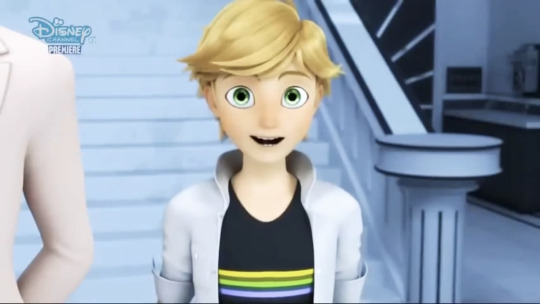
Because he understands! If his aunt is here, surely his cousin must be here too. “All together” means all together.
Yet, when Felix actually appears, draped in dramatic lighting like the theatre kid he is, Adrien still looks strangely surprised:
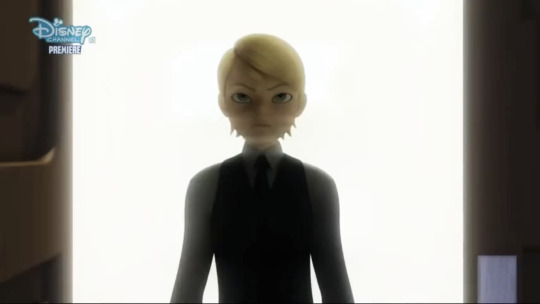
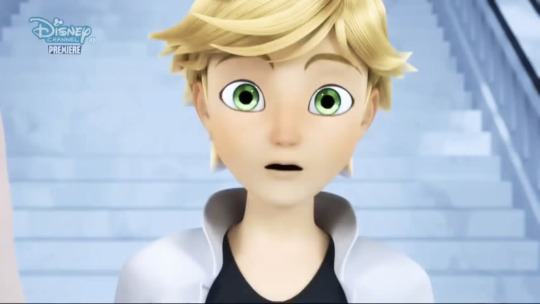
Which Amelie immediately follows up by highlighting that they look “just like twins”. The characters should not need this comment — they were here the whole time the kids were growing up! Of course, there’s a doylist explanation to this line: we, the public, must understand that Identity Shenanigans Will Ensue (and they did). But what could this mean in-world?
I propose that the cousins did not always look exactly like each other — that they were perfect twins as young kids, but became more and more different as time went by. Perhaps one developed more feminine features, while the other grew up to look more masculine. If the Agrestes did not witness the early stages of Felix’s transition (probably started right after Colt’s death, so only a few months before canon), it makes sense they would be taken aback by the newly recovered resemblance between the kids.
And, of course, it adds some depth to the Identity Shenanigans. Especially if you read Adrien as genderqueer or transfem.
3. Felix exhibits stereotypically masculine behaviours every chance he gets.
This goes from wearing what is basically the Official Rich Boy Uniform (waistcoat, tie, black and white palette):

To certain mannerisms, like putting his feet on Gabriel’s desk to assert dominance against the guy who could literally snap him out of existence:
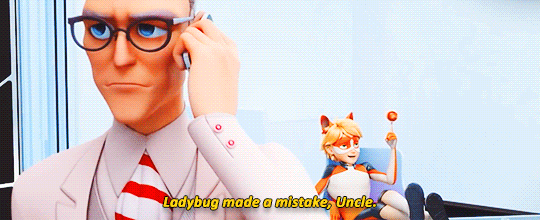
To the way he perceives himself: a cursed prince from a twisted fairytale, who systematically places himself in the role of the protector (even if it’s not always appreciated by the people in his life).
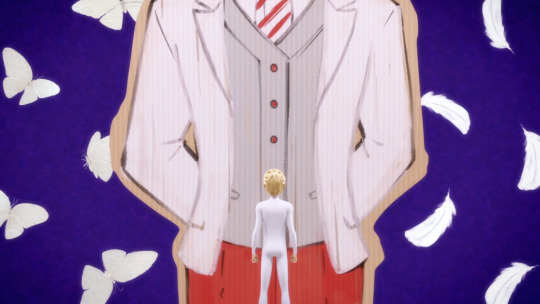
To me, this sliiightly over-the-top behaviour is very reminiscent of a child who just figured out something huge about their identity and is exploring it to the fullest — to find out what it truly means to them, and which aspects they want to incorporate into their life.
Which leads me to the most important point:
4. The Peacock Miraculous! 💜🦚
Deeply associated with Felix’s reclamation of his safety, freedom and bodily autonomy. And when we think about peacocks, what do we think about?
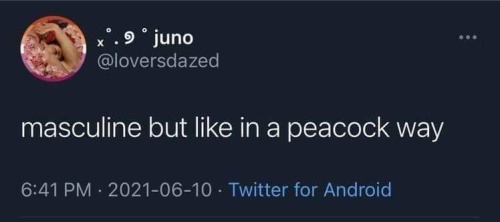
Colourful feathers. Panache. Ostentation (this is literally what groups of peafowls are called). A conception of masculinity that is different from social standards in most of the Western world, but is there and bold and unapologetic.
We don’t get to see Felix using the brooch for the first time — even his mum, who he trusts with everything, is absent. He needs this privacy to come to terms with his powers and make them his.

But then, when we do get to see him transform — everybody else witnesses it too. Felix goes from hiding behind Adrien’s face, ergo disguising as someone he is not, to revealing his identity to both the audience and the entirety of Paris.
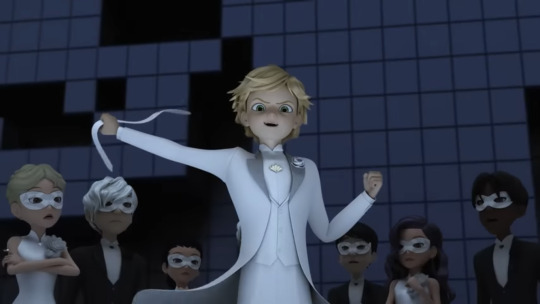
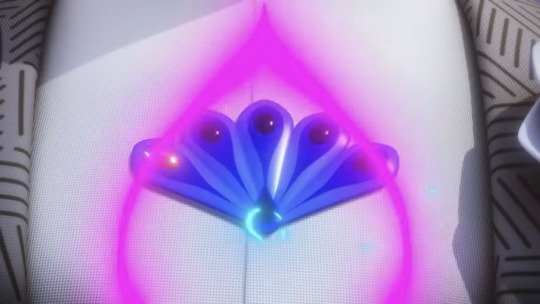

This is Argos embracing who he truly is, even if the world might call him monstrous.
And finally, one more point:
5. Why would Tomoe prefer a model over a quasi-prince as a potential match for her daughter?
I get it — she has a partnership going on with Gabriel. But the woman is leagues smarter than him (What? Like it’s hard?) and could most likely find another way to turn the world into her own little dystopian dream, should she want to. Not to mention, even if Adrien is a catch by most people’s standards, he is still the bane of the GDV lineage.
Felix is the heir. Felix is just as wealthy, if not wealthier than the Agrestes. Felix is the best at everything he does (chess, horse-riding, karate) and as such should be a perfect fit for Kagami, even by Tomoe’s insanely high standards.
Yet, she keeps referring to him as this corrupting influence: not because he is a supervillain (she hangs out with them on the regular), but because he might whisper dangerous ideas about ✨ freedom ✨ and ✨ bodily autonomy ✨ in her sweet daughter’s ear while they make out dressed as Adrien’s parents. We know how important femininity is to the Tsurugi lineage: Duusu forbid this monster talks Kagami into rejecting it in any form.
So, there you have it, Anon. I’m sure there’s a lot of evidence to support other interpretations, but this is the one that resonates most with my brain! 💜🦚🏳️⚧️

Can’t believe I almost forgot:
“Felix” literally means happiness and luck: a weird choice from Colt, and it’s unlikely Amelie had any say in the matter. So when Argos says:
“Isn’t it great? We have everything we need to be happy!”
It very much sounds like his first name could be a conscious reclamation on his end!
54 notes
·
View notes
Text
UNIFIED CUTLERY THEORY
Originally posted on my Twitter and copy/pasted: https://twitter.com/UmbralReaver/status/1233335355572543488
This is a combination of Spoon Theory, Fork Theory and Knife Theory, metaphors used to help disabled people explain fatigue and stressors to themselves and abled people.
Abled friends please share! This cost me many spoons and I'm well into knives.
Credits to original authors:
Spoon Theory - Christine Miserandino Fork Theory - Jenrose Knife Hypothesis - Terry Masson
SPOON THEORY
The first part of Unified Cutlery Theory is the essential element of energy: The spoon. The spoon is an arbitrary unit of capacity for action throughout the day.
A spoon doesn't have to be only physical energy. Mental energy, or executive function can all be represented by spoons.
You wake with a certain number of spoons. How many you have depend on you as an individual, your conditions and environment. It's not always the same, and may vary with time.
And throughout the day, you spend those spoons on tasks. Brushing your teeth might be one spoon. Making a meal could be three. A day's work might be six or more. Costs vary between individuals, and for some a trivial task may be quite costly or vice versa.
To a person with limited spoons, this can mean making hard choices between daily activities. And can result in reaching the end of the day without the spoons to eat or wash - only sleep. Worse, being severely low on spoons can, for some, even make sleep difficult.
Spoons are only recovered by rest. As mentioned, being low on spoons can sometimes make even this hard, and leave us waking with fewer spoons than expected.
It's common to try to 'save up' spoons for a big expenditure, but we have our limits. It's never as much as an abled person.
A common phrase is 'I don't have the spoons for this.'
This means a person feels that engaging in an activity would be too costly to their energy today, or even cost them tomorrow's energy as well, or that they're already too low.
Be considerate when we say this.
For some, spoons can come in different sizes. You may have some large spoons, and several small ones. In this case, it means your allotment of energy can't so easily be consolidated for different tasks.
You can keep spending small spoons on little things but while you don't have enough large ones, even if the total volume of small spoons would add up to it, you simply cannot do it. Note: The variable spoon sizes is sometimes called the 'Spell Slot' theory of fatigue.
For many people, these disabilities are invisible. While spoons are high, we might appear perfectly abled in energy and behaviour, even though the very next task might be the last one we can do in the day before collapsing.
Believe invisible disabilities.
FORK THEORY
Forks are stressors. You can only cope with so many stuck in you before you hit your limit and their very presence can limit your ability to spend and recover spoons.
Anything that makes you feel worse can be a fork, even as little as feeling hungry. Financial or relationship stress can be even bigger forks. When you hit your limit, you're done. You cannot handle any more.
This is especially relevant for neurodivergent people. Myself, for example, sufficient forks can force me to cry uncontrollably for an hour and/or become nonverbal. Our forks may be so much different from those of neurotypicals, so much that they're invisible.
How an individual is able to handle quantity and size of forks varies greatly. You may be tolerant of any number of tiny forks stuck in you, but a single pitchfork can destroy you in one go.
Or you might be able to tolerate a huge fork but it leaves very little room for smaller ones. The 'straw that breaks the camel's back' can apply here. Albeit in this case, a fork that does so.
Having too many forks can mean you can't access your spoons, even if you're full up. And dealing with removing forks themselves is often a costly task.
Sometimes the only thing you can do is abandon your current situation and try to remove the fork you can get rid of the fastest.
Sometimes, those forks are people. :I
KNIFE THEORY
Sometimes you are out of spoons, or are too full of forks to access them. But you decide to keep going. The only thing left in the drawer are knives.
A knife represents overspending of energy that draws from the future. To push yourself, sometimes dangerously, beyond your limits.
A knife can be spent in place of a spoon, again varying in size and amount depending on the individual and the tasks at hand. It can be that this works and you get it done, but you know that tomorrow it will cost you.
Knives can hurt. Each spent might take away one spoon from tomorrow. They might take more. And that means without so many spoons... you can only spend further knives.
This can result in a spiral of ever increasing fatigue until you have nothing to spend but knives, reach your limit of those, and crash.
I have had days where I slept over 20 hours due to extreme overspending. Sometimes the aftereffects last the rest of the week.
Not all disabled people can even reach for the knives, so be considerate when someone can't push themselves even if you think they should. Consider also how much harm it can do to perform this exertion.
HOW CAN I HELP?
Recognise that we are disabled, even if we don't look it. Respect us, and inform others about invisible disability.
Respect that we can't do as much as you, and that we might not want to do something due to its cost. Even if it would cost you nothing.
If you want to help (and do not impose if we refuse), you can do things to reduce our daily cost in spoons. Help clean, make meals, with the understanding that we are not lazy. We are limited. We often feel tremendous guilt at not being able to help with daily chores.
If we have forks that you can help remove (and we tell you), perhaps put in some effort to make sure they don't get stuck in again. This might include changing daily activities to be more accommodating and removing stressful triggers.
And if we are well into our knives, let us rest. We might rest for days. Don't make us get up and face the day full of fatigue. Perhaps help with tasks we'd normally have no problem with.
If you made it this far, thank you for reading. This took all of my spoons and I've spent too many knives, so I would really appreciate it if you did. I want this to have been worth it.
Credits:
Christine Miserandino ( https://twitter.com/bydls ) Jenrose ( https://twitter.com/jenrose ) Terry Masson ( https://twitter.com/Tilaurin )
And thanks to everyone that helped spread awareness.
THE JAGGED SPOON ADDENDUM
The jagged spoon looks like a spoon in all ways. It sits amongst your other spoons and makes you feel capable. You can use it to do something useful. But it's a trap. This spoon has rough, sharp edges. You try to use it and you get the task done, but it hurts you.
Effectively, you've just spent a knife instead, energy taken from tomorrow. How does a jagged spoon end up in your cutlery drawer? In my case, it was Lorazepam. It dispelled my anxiety and paranoia and made me feel I could do ANYTHING. And so I did so much that day.
And now, a day later, I am utterly destroyed by that expenditure, that at the time felt like nothing at all due to the freedom from anxiety the medicine gave me. The medicine had concealed my fatigue, not removed it. I had spent jagged spoons.
There could be any number of reasons why one might find jagged spoons at your disposal, be it drugs, mood, or simply whim of biology. We with jagged spoons must take greater care not to overspend, even when feeling great. It sucks. :(
Thank you for reading my addition to Unified Cutlery Theory. I hope it helps people understand why they might feel they have limitless energy one day then none the next.
8 notes
·
View notes
Note
The whole “they’re just evil” is ableist too though. It’s basically saying well, we thought they were mentally ill, but no, they’re just evil. Similar to how people will say “you’re not depressed, you’re just lazy.” And the whole “evil child” trope can be dangerous. Some child abusers “justify” their actions by framing their neurodivergent (mentally ill, mentally disabled, autistic, etc) child as being evil or unnatural. “creepy” behaviours in movies are common in ppl that are neurodivergent.1/2
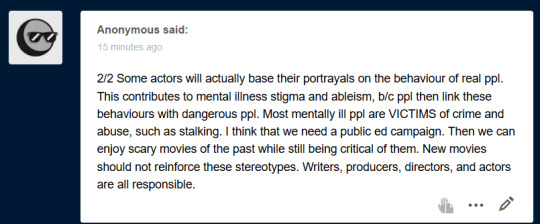
I think what it comes down to is that the horror genre is about intent in its subject matter.
The reason I like horror is because when horror is done well, it represents very clearly the fears and paranoias of the era the movie was made in.
Early horror movies (before the hayes code) had a LOT of subtext where the big fear usually was caught up in sex in some way or another. And not in an exploitative way. Movies like Cat People and Dr. Jekyl and Mrs Hyde are to do with young people who are engaged and, because it’s the 30s, are not sexually active with each other yet, but they WANT to be. And a lot of early horror has to do with sexual repression.
And then you have zombie movies which came into their own after Night of the Living Dead in 1969 and became a genre in the 70s. Zombie movies being a cultural fear of losing control of yourself and getting assimilated into a group which is slowly devouring your way of life. This can be a metaphor for immigrants, other religions, a change in social climate and old societal structures no longer being embraced by the younger generation (Zombie movies became super popular in the 70s, after the Vietnam war which was extremely protested by the younger generation, as well as racial tensions in the US rising as African Americans were coming more freely in society following the abolishment of America’s segregation in the 60s)
But some horror movies deal with fears which are universal and not contained in one one era. The fear of death is a big one but rather vague in of itself. And when framed in a movie can be rather shallow (like a slasher movie) or very deep and complex (like Jacob’s ladder or Masque of the Red Death). Other universal fears are things like war, home invasion by a criminal, being hunted (either by an animal or another human), the unknown (this often taking the form of “evil” in terms of ghosts and demons and possession etc etc), one’s own body succumbing to disease (which is where body horror comes from) and the loss of control of oneself (this is where mind control and possession and other dehumanising tropes are used, although these can cross over into the trope of cultural tension. The Invasion of the Body Snatchers is all about loved ones being replaced with unknown enemy creatures and was made (twice) during the US’ cold war with Russia)
One of the great universal fears is the concept of not being in control of one’s own mind. It doesn’t matter if you’re neurotypical or have a form of mental illness, the core concept of losing yourself to your own mind is a horrific one (and I mean this in terms of the concept, not the reality) so I feel horror movies that deal with this trope WELL, understand how to channel that fear into an effective story that resonates with its audience, regardless of who they are. However, this is VERY different than the much easier and lazier method of just claiming a bad guy is “crazy”. Because the neurotypical audience will still nod and go “yes it is very scary to think of people being crazy like that or even of myself losing my mind. That is a scary thought.” but it does NOT use the trope with the complexity and depth it needs to properly express that dark fear.
The other great fear, and one used FAR less frequently in horror movies simply because it is disturbing, is the innate fear parents have that a baby who they wish to love could have “something wrong with it.” not out of stigmatism, but because (most often) parents wish for the best for their children, and the concept of a child having a problem the parents can’t fix is terrifying. This is where movies like Eraserhead come from, however it also ties into the fear of mental illness.
There is also the thing that having mental illness within the bad guy character gives to horror but which is not only reserved for mental illness, and this is where the “evil” explanation comes from; and that is the horror that comes from the idea that a bad person is not someone you can recognise in the street as a threat. That you cannot see someone and immediately go “oh well they have horns so I KNOW they’re dangerous!” but that threat and danger and harm can hide in the nicest, kindest, most ordinary looking people. In modern times we now know you don’t need mental illness to be a threat and look normal, but I feel this is why mental illness is often used.
This brand of horror is also very important because it asks the audience “what is the difference between the person in the movie doing terrible things, and you, the audience member, who probably assumes themselves to be a good person?” Mental illness is a good answer to this because it gives the audience the uncomfortable thought of “if I had the same mental struggles, would I be doing terrible things like this too? What makes me “a good person”? Am I any different than the bad guy at all?”
Horror is a good genre because it shines a light on fears and insecurities and paranoias of human beings. Either culturally, or psychologically. And I feel the problem is that so often complex ideas and reasons BEHIND the horror is lazily boiled down to “oh well they were just crazy. That’s all.” which makes the audience not have to worry about it because “oh of course. They’re just crazy. Not like me. I’m not crazy at all.”
But this is…. this is bad writing :/ and as the previous post said (if you are the same anon) it is the using of the trope in a lazy way which reinforces itself as harmful. And you often see this in cheap horror movies who are NOT trying to say something about humanity’s deep rooted fears, but just want some teenagers to scream in the theater for 90 minutes at some fake blood and a “scary bad guy”.
I agree that modern movies should not reinforce bad stereotypes of mental illness as we often see in badly written lazy horror films, but I don’t think it’s a topic that should be untoucheable in terms of story telling. Because I feel then we deny a huge part of the human psychology.
hmmm…. how do I put this…..
Ok maybe this’ll make more sense.
Silent Hill 2 is a game where the entire subtext and plot is about depression. Without it being a plot point in any way, the game feels like it is trying to EXPRESS depression. And it expresses depression in the form of horror visuals both in terms of monsters and scenery. Depression is never mentioned and nobody talks about the symptoms of depression (not counting Angela’s suicidal thoughts but that’s not really the point here). Silent Hill 2 is a story about depression and fatal illness and suicidal thoughts. It is a game about the horror of those feelings… And you could even easily say the game even features a character with depression who is a murderer… but the game is not presenting depression as an “explanation”. But it is a game ABOUT depression. Through its visuals, sound design, atmosphere, music, it all builds together to present itself AS depression.
And I feel we need stories like that. It presents mental illness in a horrific light… but it’s… it’s different, you know? And I feel having the ability to tell horror stories about mental illness is important because then we can have stories like Silent Hill 2, which in a weird way becomes comforting if you’ve ever experienced depression. It’s like you go back to Silent Hill 2 when you’re in a depressive state and you just feel…. a little better? like “yes…. this is the emotion I am feeling. This is what it’s like. Somebdy else understands it, and this story resonates with me. And I am not alone.”
I know that is a completely different thing than what we were talking about regarding “bad guy characters in a horror movie have mental illness” but I feel it’s an important point…. because Silent Hill 2 is literally about a guy who killed someone and has a mental illness…. the difference is he’s not framed as a bad guy, but as sympathetic. WITHOUT condoning his actions.
And as for “evil” like “oh he’s not crazy he’s just evil”, I understand what you mean but I think of it more regarding either tied to religious beliefs which is a more personal fear and varies depending on who the person watching the movie is…. or the evil which is like…. Ted Bundy…. and I don’t really want to talk about that because it legit makes me incredibly uncomfortable.
(also Horror is AMONG my favourite genres or sub genres. But it depends on the film. But it’s a genre I legit am fascinated by, enjoy depending on the film, and have watched and read and own WAY too many books about).
A big function of horror movies is to acknowledge the fears humans carry within us, as well as the darker sides of humanity as a whole, and horror movies gives us a way to confront that, and not simply try to ignore it while it festers away in the back of our minds.
So it’s difficult because you can’t say “you can’t make a horror movie about x” because it ends up being more harmful than good…. but at the same time reinforcing stigmas that hurt oppressed groups is also something which should NOT be done.
This is why I tend to judge horror movies on a case by case basis X’D and also consider context, era, country of origin etc etc.
And it’s why I’m talking about this topic in such long posts. Because I feel it’s a complex problem.
But I fully agree we need a public ed campaign in teaching people about the context in which older horror movies were made and to understand how to be critical of their themes while still being able to be entertained by them.
….I didn’t even go into how monster movies like King Kong and Creature from the Black Lagoon are about cultural paranoias about people from different ethnicities and cultures “coming to steal our women”, and why you are seeing a lot more “monster fuckers” these days as our culture is slowly learning to be more empathetic to “those who are other”. Like…. I didn’t even go INTO that part of it.
…..I like horror u guys.
40 notes
·
View notes
Note
I have anxiety and it causes me to fidget a lot, usually i play with a necklace or earphones or something but i was thinking of getting a spinner or fidget cube, my school allows them for kids who need them. Do you think my anxietys reason enough?
I’ll preface this, anon, by saying that what I think may not match what your school thinks. Depending on where you are and the type of school, they might have limiting, ignorant assumptions around who needs to stim and who doesn’t, so be aware of that going in: it might be a tougher fight than just bringing a fidget cube into the classroom. (Which can already be frightening enough.)
Your school sounds better than many, but I’ve had a previous ask from an another anxious anon who was denied the right to stim in school based on the school’s ignorance (that only autistics stim) so I do feel the need to say that the stim community, in recognising who benefits from stimming, is several steps ahead of many medical and academic communities right now. This isn’t to discourage you, just to let you know that you may have to climb over a metaphorical fence or two in order to enjoy your fidget cube in the classroom.
But I absolutely think this is reason enough. Absolutely. Without question.
Anon, if you think stimming will benefit you, do it. If you think it will improve your life in some way or make it easier to function, do it. If you think it’ll be more fun to fidget with a cube instead of earphones, do it. If you’ve never stimmed in your life and you want to try it out to see if it works for you, do it.
I said in the linked post that anxious (and allistic stimmers generally) improve my experience in the classroom/office/outside world as an autistic stimmer. They help introduce others to stimming. They help educate teachers and bosses so I don’t have to do it all myself. They share discoveries on blogs like this one. They give stimmers, many of us who struggle with social interactions for various reasons, a way to approach somebody else, a ready topic of conversation. (I don’t know how to admire someone’s new haircut, if I even notice it at all, but I can admire their pretty fidget cube and ask where they got it.) They make stimming that little bit more acceptable, that little bit safer, for everyone who stims. Sure, we stim for different reasons, in different ways, and have different relationships to stimming. But we’re stronger, as neurodivergent and/or disabled people, if we all stim together. We can acknowledge our differences and still support each other in stimming.
I’ve also said a couple of times that we really don’t know how many people’s lives might be enriched by stimming, as it’s such a repressed and frowned-upon behaviour. This extends to various kinds of disabilities and even NT people! (Some of whom might not be abled/NT after all: stim toys might be how they connect with the community and discover their disability and/or neurodivergency.) My preference is to keep this space focused on the ND and/or disabled stimmer experience, but I’m not here to debate on who can or can’t stim. I’m never going to tell someone they can’t stim. I do tell NT-identified people to be willing to take a backseat in conversations here, as I wish the focus to be on ND/disabled stimmers (even if it’s just “I think I’m ND but I don’t know how yet”) but that’s it. I can’t and shouldn’t and won’t stop anyone from buying a fidget cube and trying it out for themselves.
(My dad doesn’t have the dialogue of NT or ND; he’d say he’s “normal”. He also ended up acquiring one of my new fidget spinners yesterday and spent yesterday evening sitting on his desk chair, spinning his new spinner and rolling a massage ball - something else I gave him - under his foot while watching the footy. He’s so autistic, seriously, but it’s not a conversation he’s open to having - it’d be quite dangerous for me to have it, in fact. So I just give him stim toys and remember that there’s NT or “normal” people who have slipped through the cracks and are discovering stim toys for the first time. Toys that make them happy, fulfilling long-suppressed or unrealised needs.)
Please, anon, get your toys and enjoy them. You have as much right to explore the tools that improve the classroom experience as anyone else. You are helping other stimmers by doing so. You’re not taking anything away from us by doing something that helps you. Just be open to conversations with others - the autistic sitting beside or behind you might find the sound of the spinner really annoying, and you might need to discuss ways so you’re both able to function in the classroom. (I think every stimmer, at some point, needs to talk with another stimmer about a stim that makes them unable to focus. We’ve all needed or will need to negotiate keeping one stim to one’s own space and using another around that person instead.) But, absolutely, stim and explore stim toys.
You are as entitled to toys and disability aids as I am.
- Mod K.A.
#ask#text#anon#discussion post#stimming discussion#neurodiversity discussion#inclusivity discussion#mod K.A.#reassurance post#anxiety discussion
6 notes
·
View notes